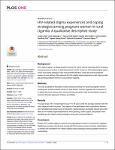| dc.identifier.citation | Jolle, J., Kabunga, A., Okello, T. O., Kadito, E. O., Aloka, J., Otiti, G., ... & Udho, S. (2022). HIV-related stigma experiences and coping strategies among pregnant women in rural Uganda: A qualitative descriptive study. PloS one, 17(10), e0272931. | en_US |
| dc.description.abstract | Background
HIV-related stigma is a global problem among HIV clients with far-reaching effects including
increased rates of mother-to-child transmission of HIV. However, HIV-related stigma experiences
and coping strategies have received little attention, especially among pregnant
women in rural settings. We explored the HIV-related stigma experiences and coping strategies
among pregnant women in rural northern Uganda.
Methods
This was a qualitative descriptive study conducted among HIV-positive pregnant women
seeking care at Aboke Health Center IV, Kole district, northern Uganda. We conducted 12
in-depth interviews using a semi-structured interview guide. Data were analyzed using the
inductive thematic approach of Braun and Clarke.
Results
The age range of the 12 participants was 17 to 35 years while the average duration with HIV
since diagnosis was five years. The majority of the participants were subsistence farmers
who had attained a primary level of education. Social rejection and public ridicule were identified
as HIV-related stigma experiences while ignoring, social support, and prayers were
identified as HIV-related coping strategies among the study participants.
Conclusion
Enacted HIV-related stigma is common among pregnant women in rural northern Uganda.
Healthcare providers should work closely with HIV-positive women and other stakeholders
to identify and strengthen HIV-related stigma coping strategies among pregnant women in
rural settings. | en_US |

